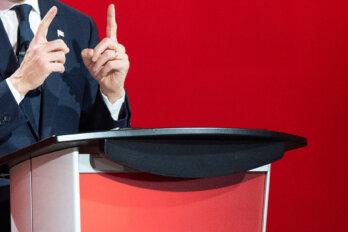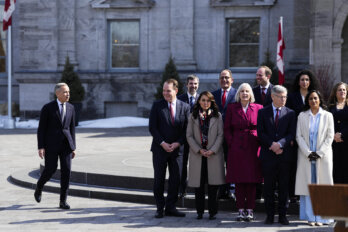Flora MacDonald, laid to rest in Ottawa on Sunday at age eighty-nine, was a pioneer for women in politics, and held a deep commitment to democracy and social justice. I could never understand why she was a Conservative. But then, as an American immigrant, I’ve always had a hard time understanding the whole concept of Red Toryism. No doubt, she was the reddest of the bunch. She didn’t like Stephen Harper or his government much. Perhaps that’s why the prime minister couldn’t bring himself to pay tribute to one of the greatest women in Canadian history (except with a tweet, which botched her last name), or even attend her funeral.
Flora, as everyone called her, was involved at the ground level in almost every advance that women in this country made, especially in her early years. After leaving politics in 1988, she devoted her life to international development work, no doubt turning down offers to serve on corporate boards or otherwise make piles of money.
She contributed a paper to the Royal Commission on the Status of Women in the late 1960’s, proposing that parliamentary seats be reserved for women. Flora discovered the idea when she visited South Asia. She explained this in a 2003 interview for my book Ten Thousand Roses: The Making of Feminist Revolution. A planned chapter on women and politics didn’t make it into the published volume. And this part of my interview with Flora is published here for the first time:
I had been traveling in India and doing a lot of work on the way in which women had become involved with Ghandi in the protest movements against the [British]. What interested me was the way in which they had marched equally, been jailed equally, and come out equally out of all of that turbulence. When India received independence, the government of Nehru wanted women in Parliament, but they weren’t nominated, and they weren’t chosen. So, for a while, he set up what were called women’s constituencies . . . . They were in addition to the members of parliament. The members of parliament became used to having women sit in the house. It was a transition. Eventually, that was done away with because there were enough women being elected. Now, I think that India has regressed since that period, but it was a bright shining period, and there were a number of very important women who came to the fore at that time. I proposed something in the way of a transitional state for women here in Canada . . . so that there was almost like a quota that had to be female in the House of Commons.
At the time, there was one only one woman in Parliament (as compared to seventy-six today), despite the fact that Canada’s first female MP, Agnes Macphail, had been elected in 1921. The idea of quotas to correct this inequality was too radical for the Royal Commission, but not for Flora.
Those who say she was not a feminist are mistaken. We asked her the question, “Are you a feminist?” Her answer:
I’ve always been a feminist, long before the word was ever used. I grew up in a background that made me a feminist without having to go out and proclaim it. My grandfather was the captain of one of the world’s great clipper ships. And my grandmother sailed with him, the only woman aboard ship, and two of her four sons were born at sea. She was in China, in India, in South Africa, in Chile. My father grew up thinking that women could do anything, because his mother did. So, when he had five daughters, he treated us in that way. I mean we could do anything we wanted. We were considered by my parents the equal of any of the boys in the neighbourhood, and we didn’t think that was unusual.
With that attitude, it’s no surprise she was often the first woman to hold various positions in this country, from executive director of the federal Conservative Party to minister for external affairs. And in some cases, her pioneering style was recognized on the world stage. “In 1979, [at] the NATO ministerial meeting, the then head of NATO asked everybody to rise to salute the fact that for the first time a woman was sitting in there,” she told me. “For twenty-five years, this group had been making plans about war and peace and never [was] a woman’s voice in it. I [was] the first woman to be foreign minister, the first woman to be this, that, or the other thing. And you have to always think that when you are in that position, there are a good many other people who will be seeing how you do. You will be held up as an object of admiration or . . . of great criticism.”
Flora recognized that almost every issue has a women’s component to it—even a seemingly gender-neutral policy area such as campaign finance. “There was always a lot of money put in during the election campaign by those who could afford it,” she answered, in response to a question about her legislative achievements. “Well, women couldn’t. So we put on a limit . . . . Mine went up as the population increased. It was $40,000 then up to $50,000. But half of that, if I got more than 15 percent of the vote, half of that would be returned by the federal government. That meant that you had to raise $25,000. That was much more accessible to your finance committee. It enabled women and people from different ethnic backgrounds to run as well.”
The first time I encountered Flora MacDonald was in the 1980’s. She was the employment and immigration minister in Brian Mulroney’s government. I was working with a coalition for people with disabilities for employment equity. Much to our surprise, the Minister decided to release the new Employment Equity Act on March 8, 1986, International Women’s Day. We were delighted that a Conservative government was accepting the recommendations of Justice Rosalie Abella’s Royal Commission Report on the poor employment prospects of what she called target groups: women, aboriginal people, people with disabilities and visible minorities. We thought the bill was weak but it at least provided recognition of systemic discrimination against particular groups. The day of the bill’s passage, we organized an unprecedented demonstration of deaf, blind, and mobility-disabled people in front of parliament. Talking about the Employment Equity Act in our interview, she said:
The greatest opposition came from those who were disabled. They didn’t think it went far enough . . . . I remember one time, they flooded the galleries and stood up and shouted at me. [These ended up being the same] people who really worked hardest at taking advantage of that legislation and improving their lot, the disabled. You will see that as you go through the public service and see people who are considered disabled, or physically impaired in some way, where you would not have seen that before. Every time I see one of [these disabled workers getting opportunities they deserve], I think, gosh, good for you.
“Gosh, good for you.” That was Flora MacDonald all the way. Instead of resenting that the very people she was trying to help were yelling at her from the gallery, she rejoices in their agency and ability to achieve more than even they thought they could. She was a true democrat and a great person. To borrow a Yiddish terms, she was a true mensch—a person of integrity and honour.




